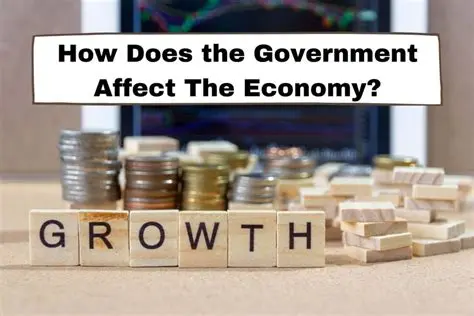The role of the US government in shaping the economy cannot be underestimated. From government spending and taxation policies to regulations and monetary interventions, the decisions made at the government level have a significant impact on the overall economic landscape. In this blog post, we will explore the various ways in which the US government affects the economy, delving into topics such as government spending and its influence, taxation policies and their economic impact, the role of regulation in shaping the economy, the effects of monetary policy, and government interventions during economic crises. By understanding the complexities of these elements, we can gain a clearer insight into how the government’s decisions and actions shape the economic environment in which we operate. So, join us as we unpack the intricate relationship between the US government and the economy and gain a deeper understanding of the mechanisms at play.
Government spending and the economy
Government spending plays a crucial role in shaping the economy of a country. When the government invests in various sectors such as infrastructure, healthcare, and education, it can stimulate economic growth and create job opportunities.
Increased government spending can also lead to higher consumer demand, which in turn can drive business expansion and contribute to overall economic development. However, excessive government spending without proper fiscal discipline can lead to budget deficits and inflation, which may have negative consequences on the economy.
It’s important for policymakers to carefully consider the potential impact of government spending on the economy, and to strike a balance between investing in key areas and maintaining financial stability.
Ultimately, the effectiveness of government spending in driving economic growth depends on how efficiently the funds are allocated and managed, and whether they are directed towards initiatives that will yield long-term benefits for the country.
Taxation policies and their economic impact
Taxation policies play a crucial role in shaping the economic landscape of a country. They not only serve as a source of government revenue but also have a significant impact on the behavior of individuals and businesses. A well-designed taxation system can promote economic growth, investment, and innovation, while a poorly implemented one can stifle economic activity and hinder development.
One of the key ways in which taxation policies affect the economy is through their influence on consumer behavior. High taxes on goods and services can lead to decreased consumer spending, which in turn can dampen demand and slow down economic growth. On the other hand, tax incentives and breaks can stimulate consumer spending and investment, leading to increased economic activity.
Furthermore, taxation policies can also affect the competitiveness of businesses. High corporate taxes can reduce the profitability of businesses and discourage new investment, while low taxes can attract foreign investment and stimulate job creation. Additionally, the complexity of tax codes and regulations can also impact the ability of businesses to operate efficiently and grow.
In conclusion, taxation policies have a significant impact on the overall health of the economy. Well-designed policies can promote growth and prosperity, while poorly executed ones can lead to stagnation and decline. It is crucial for policymakers to carefully consider the economic impact of taxation policies and strive to create a system that is fair, efficient, and conducive to economic development.
Regulation and its influence on the economy
Regulation plays a crucial role in shaping the economy of a country. Government regulations are designed to ensure fair competition, protect consumers, and maintain stability in the financial system. However, excessive or ineffective regulations can stifle economic growth and innovation, leading to negative consequences for businesses and individuals.
Regulatory compliance is essential for businesses to operate within the bounds of the law. This involves adhering to rules and standards set by government agencies, which can affect the cost of doing business and impact the overall performance of industries. Striking a balance between regulation and economic growth is crucial for sustained prosperity.
Furthermore, regulations can influence investment decisions and market outcomes. For instance, environmental regulations may encourage the development of clean energy technologies, while financial regulations can safeguard against market manipulation and fraud. However, burdensome regulations can discourage businesses from expanding and limit job creation, impacting the overall economic health of a nation.
In conclusion, while regulations are necessary to protect the public interest and promote economic stability, it is important for policymakers to carefully consider the potential impacts of regulations on the economy. Striking a balance between regulatory requirements and economic growth is crucial to ensure a thriving and competitive business environment.
Monetary policy and its effects on the economy
Monetary policy plays a crucial role in shaping the economic landscape of a country. It refers to the actions taken by a central bank to control the money supply and interest rates in order to achieve certain macroeconomic goals. These goals typically include promoting economic growth, controlling inflation, and maintaining a stable currency value.
One of the key tools used in monetary policy is interest rates. When a central bank wants to stimulate economic activity, it may lower interest rates to encourage borrowing and spending. On the other hand, if the goal is to control inflation, the central bank may raise interest rates to reduce consumer and business spending.
Money supply is another important aspect of monetary policy. By increasing or decreasing the amount of money in circulation, central banks can affect the overall level of economic activity. For example, during times of economic recession, a central bank may choose to increase the money supply to boost spending and investment.
Overall, the impact of monetary policy on the economy is significant. By influencing interest rates and money supply, central banks can have a profound effect on consumer spending, business investment, and overall economic growth. It is crucial for policymakers and businesses to understand and monitor the effects of monetary policy in order to make informed decisions.
Government interventions during economic crises
During times of economic crises, the role of the government becomes crucial in stabilizing the economy and preventing a complete collapse. Government interventions can take various forms, including fiscal and monetary policies, as well as direct interventions in key sectors of the economy.
One of the most common forms of government intervention during economic crises is through fiscal policies. This can involve increased government spending on infrastructure projects, social welfare programs, and other initiatives aimed at boosting economic activity and creating jobs.
In addition to fiscal policies, monetary policies such as lowering interest rates and quantitative easing can also be deployed to stimulate the economy and encourage borrowing and investment.
Furthermore, targeted interventions in specific industries or sectors that are particularly hard hit by the crisis can also be implemented by the government. This may involve providing financial assistance to struggling companies, implementing regulatory changes, or even nationalizing certain key businesses to prevent their collapse.
Frequently Asked Questions
How does government spending affect the economy?
Government spending can stimulate economic growth by creating jobs, increasing demand for goods and services, and improving infrastructure. However, excessive government spending can lead to inflation and increase the national debt.
What is the impact of taxation policies on the economy?
Taxation policies can influence consumer spending, investment, and economic growth. Lower taxes can stimulate economic activity, while higher taxes can reduce disposable income and dampen economic expansion.
How does regulation influence the economy?
Regulation can protect consumers and the environment, but excessive regulation can increase costs for businesses and hinder economic growth. It can also lead to reduced competitiveness in the global market.
What are the effects of monetary policy on the economy?
Monetary policy, such as interest rate adjustments and quantitative easing, can influence inflation, borrowing costs, and overall economic activity. It can also impact exchange rates and international trade.
How does the government intervene during economic crises?
During economic crises, the government can implement stimulus packages, bailouts, and other measures to stabilize the economy and prevent a full-scale recession. However, these interventions can also lead to long-term consequences and moral hazard.







